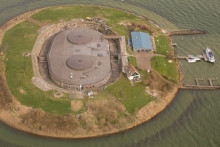Considering that the long wait created considerable discomfort, Amsterdam’s city council was keen to ensure that ships kept making their way to its harbor–instead of sailing off to main competitor Antwerp’s one. To that end, they copiously provided the captains and their crew, with not just free water, food and soap, but also with free alcohol and prostitutes. This kept most of the menfolk busy into the small hours. As a result of the heavy drinking that ensued, many a man ended up lying on the Pampus sandbank, no longer able to stand on their feet or sleeping off their hangovers.
 These events in the 17th and 18th century gave the expression the meaning it has today; ‘voor pamus liggen’ (‘lie for pampus’) means to be exhausted or knocked out due to an overdose of either drink or food. Fortunately, the seafarers’ behavior could not be seen from Amsterdam’s weeping tower, located at the front of the city, from where the womenfolk waved off their loved ones going to sea − or warmly welcomed them upon arrival.
These events in the 17th and 18th century gave the expression the meaning it has today; ‘voor pamus liggen’ (‘lie for pampus’) means to be exhausted or knocked out due to an overdose of either drink or food. Fortunately, the seafarers’ behavior could not be seen from Amsterdam’s weeping tower, located at the front of the city, from where the womenfolk waved off their loved ones going to sea − or warmly welcomed them upon arrival.
Later on, the sandbank got extended and turned into a proper little island, also named Pampus. It contains a fortress and can be visited from Amsterdam during summers.




